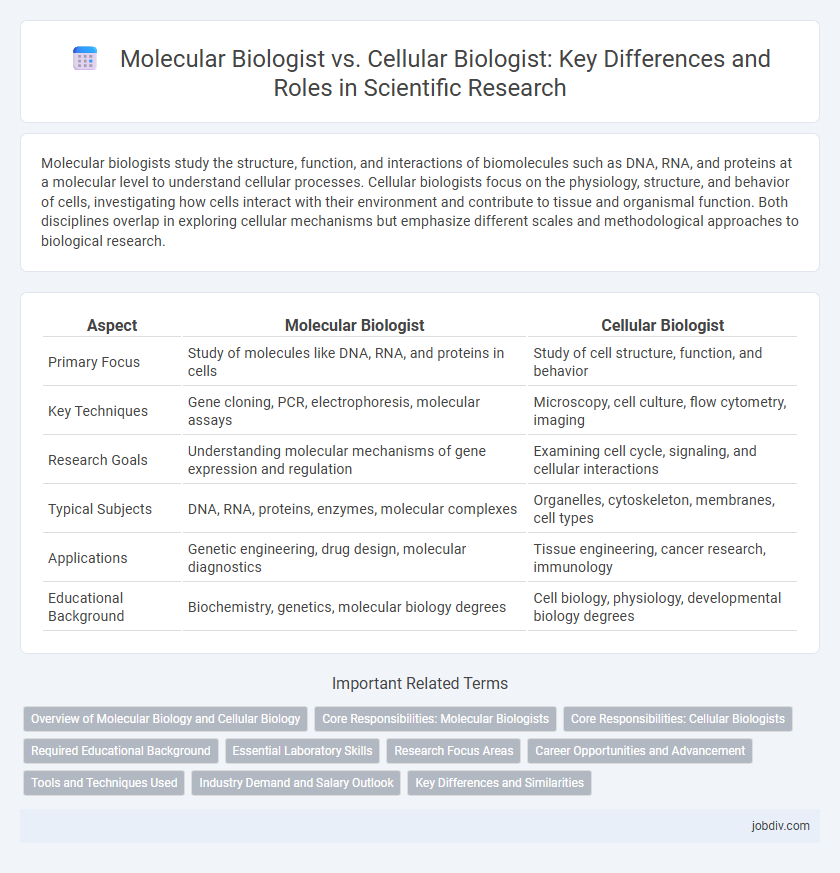Molecular biologists study the structure, function, and interactions of biomolecules such as DNA, RNA, and proteins at a molecular level to understand cellular processes. Cellular biologists focus on the physiology, structure, and behavior of cells, investigating how cells interact with their environment and contribute to tissue and organismal function. Both disciplines overlap in exploring cellular mechanisms but emphasize different scales and methodological approaches to biological research.
Table of Comparison
| Aspect | Molecular Biologist | Cellular Biologist |
|---|---|---|
| Primary Focus | Study of molecules like DNA, RNA, and proteins in cells | Study of cell structure, function, and behavior |
| Key Techniques | Gene cloning, PCR, electrophoresis, molecular assays | Microscopy, cell culture, flow cytometry, imaging |
| Research Goals | Understanding molecular mechanisms of gene expression and regulation | Examining cell cycle, signaling, and cellular interactions |
| Typical Subjects | DNA, RNA, proteins, enzymes, molecular complexes | Organelles, cytoskeleton, membranes, cell types |
| Applications | Genetic engineering, drug design, molecular diagnostics | Tissue engineering, cancer research, immunology |
| Educational Background | Biochemistry, genetics, molecular biology degrees | Cell biology, physiology, developmental biology degrees |
Overview of Molecular Biology and Cellular Biology
Molecular biology examines the interactions and functions of biomolecules such as DNA, RNA, and proteins at the molecular level to understand genetic expression and regulation. Cellular biology, or cell biology, studies the structure, function, and behavior of cells, emphasizing organelles, cellular processes, and cell communication. Both disciplines employ techniques like microscopy and molecular assays but focus on different organizational scales to elucidate life's complexities.
Core Responsibilities: Molecular Biologists
Molecular biologists focus on understanding the structure, function, and interactions of molecules such as DNA, RNA, and proteins within cells. Their core responsibilities include conducting experiments to analyze genetic material, investigating gene expression and regulation, and developing molecular techniques like PCR and gene editing. They play a critical role in advancing knowledge of cellular mechanisms at the molecular level, contributing to fields such as genetics, biotechnology, and medicine.
Core Responsibilities: Cellular Biologists
Cellular biologists specialize in studying cell structure, function, and behavior using techniques such as microscopy and cell culture to analyze cellular processes like signaling, division, and differentiation. They investigate cellular responses to environmental stimuli and the mechanisms underlying cell communication, contributing to advancements in disease research and regenerative medicine. Their core responsibilities include designing experiments, interpreting cellular data, and collaborating with multidisciplinary teams to understand cellular dynamics within tissues.
Required Educational Background
Molecular biologists typically require a strong foundation in biochemistry, genetics, and molecular biology, often obtained through a bachelor's degree in molecular biology or related fields, followed by advanced degrees such as a master's or Ph.D. Cellular biologists focus on the structure and function of cells, necessitating education in cell biology, physiology, and microscopy techniques, with postgraduate specialization favored. Both career paths demand extensive laboratory experience and proficiency in experimental design and data analysis to conduct research at the molecular or cellular level.
Essential Laboratory Skills
Molecular biologists excel in DNA/RNA extraction, PCR, gel electrophoresis, and cloning techniques essential for analyzing genetic material at the molecular level. Cellular biologists are proficient in cell culture, microscopy, flow cytometry, and immunostaining to study cell structure, function, and interactions in vitro. Both disciplines require strong skills in data analysis, sterile technique, and experimental design to ensure accurate and reproducible results.
Research Focus Areas
Molecular biologists primarily investigate the structure, function, and interactions of biomolecules such as DNA, RNA, and proteins to understand genetic expression and regulation at the molecular level. Cellular biologists focus on studying the physiology, behavior, and life processes of cells, including cell division, signaling pathways, and cellular interactions within tissues. Research in molecular biology often involves techniques like gene sequencing and molecular cloning, whereas cellular biology relies heavily on microscopy and cell culture methods to explore cellular architecture and function.
Career Opportunities and Advancement
Molecular biologists primarily focus on the study of genes, proteins, and molecular mechanisms, making their expertise highly sought after in biotechnology, pharmaceuticals, and genetic engineering sectors. Cellular biologists concentrate on the structure and function of cells, offering career opportunities in medical research, cancer biology, and regenerative medicine. Career advancement in molecular biology often involves specializing in areas like genomics or proteomics, whereas cellular biologists may progress through roles in cellular therapeutics or advanced microscopy techniques.
Tools and Techniques Used
Molecular biologists primarily utilize tools such as polymerase chain reaction (PCR), gel electrophoresis, and DNA sequencing to analyze nucleic acids and proteins at the molecular level. Cellular biologists employ microscopy techniques including confocal microscopy, live-cell imaging, and flow cytometry to study cell structures, functions, and interactions in situ. Both disciplines integrate advanced methods like CRISPR gene editing and fluorescence tagging to manipulate and visualize biological samples, enhancing the precision of their experimental investigations.
Industry Demand and Salary Outlook
Molecular biologists and cellular biologists are both in high demand within biotechnology, pharmaceutical, and medical research industries, with molecular biologists often sought for expertise in genetics and protein interactions, driving advancements in gene therapy and personalized medicine. Salary outlooks vary slightly, with molecular biologists typically earning an average annual salary ranging from $65,000 to $95,000, while cellular biologists tend to have a similar range but may see competitive advantages in sectors focused on cellular modeling and drug development. Industry growth projections indicate robust opportunities for both fields, fueled by ongoing innovation in molecular diagnostics and cellular engineering technologies.
Key Differences and Similarities
Molecular biologists study the structure, function, and interactions of biomolecules such as DNA, RNA, and proteins at a molecular level to understand genetic and biochemical processes. Cellular biologists examine the structure, function, and behavior of cells, including organelles and cellular processes like cell division and signaling pathways. Both fields overlap in exploring cellular mechanisms, but molecular biology focuses on molecular components, while cellular biology emphasizes whole-cell functions and interactions.
Molecular Biologist vs Cellular Biologist Infographic

 jobdiv.com
jobdiv.com